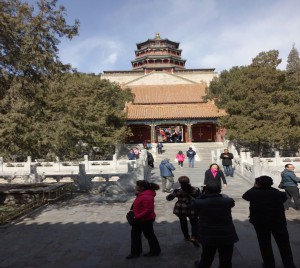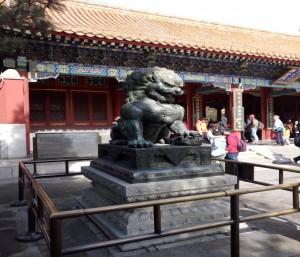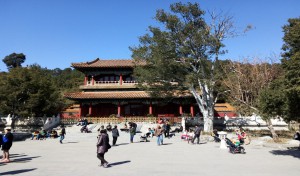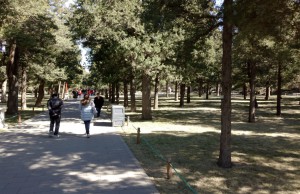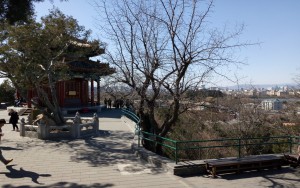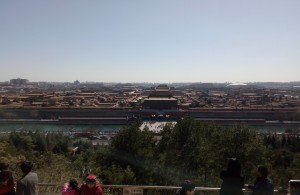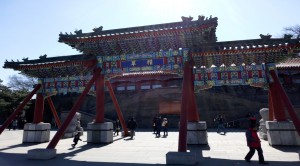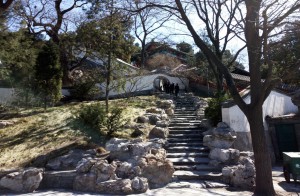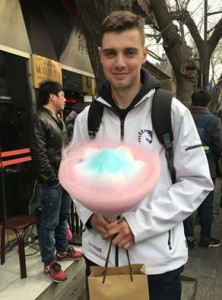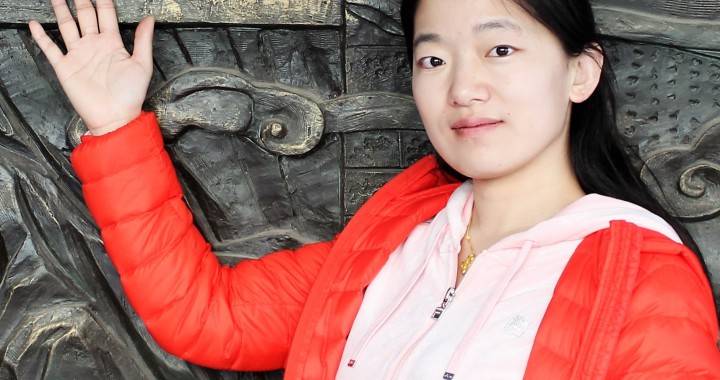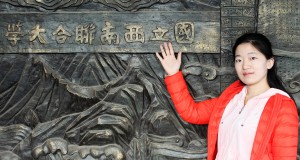I have quite a few “Chinese” experiences in my time here in Beijing, but the one that stands out most is from the day I visited the Ikea store, here in Beijing. It had never hit me until that day how different and crazy things could be here in China! Like most Ikeas, the store was huge. Everywhere I looked, people were sprawled out on the furniture, either relaxing or in deep sleep. To me it looked like people had come here for a day out to sleep and relax in the showroom beds and furniture. Some had even brought along pyjamas and slippers to have a kip, and get the full experience. There was security and store attendants all around, but nothing was done to move the sleepers from their resting places, probably due to the sheer volume of people!
Author Archives: Fredrik
Remember to explore! By Henrietta Koortzen
So you find yourself in Beijing, doing your best to teach Chinese children some English. You might be doing it because you enjoy teaching and working with kids. Maybe you are here to save up some money or maybe you are just here so you can say that you have lived and worked abroad. Whatever the reason, five days of the week you work hard and try to teach an excited class of 5 year olds to describe that book as being blue or – if their English is good – to spell and write their own names. The other two days are yours. Yours to do as you please and, in a city like Beijing, the world is your oyster.
At first, walking to the little shop not ten steps from my flat seemed risky. I might take the wrong turn on my way back and get lost. However, as time passed, certain things started to look familiar. I started walking around, exploring different streets and coming across the cutest little restaurants and fresh fruit markets. The ten steps had turned into a bus ride to a mall not too far away. Finally, the bus ride evolved into a journey on the subway and an entire day exploring around Tiananmen Square and the Forbidden City. Living two minutes from a station on Beijing Subway Line 1, my days off turned into days of exploration. Once you familiarise yourself with and feel confident using the public transport, you can get anywhere. And oh wow, the places to visit in Beijing never cease to amaze.
With great company by my side, we have found our way to some truly amazing places: The Summer Palace, Beihai Park, and The Temple of Heaven to mention only a few. These not including the wonderful places that you accidentally stumble upon and most likely will not find again. The idea of wandering around the hutongs in the narrow and sometimes very dodgy-looking streets motivates you to work hard and reward yourself with the best of what Beijing has to offer. For me, there are still so many places unseen in the ‘wilderness’ that is Beijing and in the wise words of Russell from the animated movie UP – The wilderness must be explored!
Misunderstandings in China, by Greg McInerney
Misunderstandings occur in Beijing on a daily basis if you’re a clueless foreigner like me with only a pocket full of poorly pronounced Chinese phrases to rely on. I suggest you incorporate a daily game of charades into your routine before coming here because miming is an essential tool to try and minimise the gravity and frequency of your misunderstandings. You will of course learn Chinese as you go, through lessons provided by the school, a private tutor, or just by picking things up here and there, but beware because Chinese is a language where the same word with a slightly different tone can mean something entirely different. These words are known as homophones and they can often have hilarious unintended consequences.
For example “xiong mao” means panda, but say it in a slightly different tone and it means chest hair. You may find yourself wandering around Beijing zoo asking bewildered locals where you can find the chest hair exhibit because you’re particularly excited to see the new baby chest hair everyone has been talking about. Perhaps you might have a really bad experience at a restaurant and you demand to speak to the owner or “ye zhu”. Say this slightly wrong and you will be indignantly requesting an audience with a wild boar. You could ask your Chinese friend how long they have been married to their husband or “lao gong” for? Get the tones wrong on this one and you will be referring to her husband as her “labourer”. Insert dodgy 80’s sexist humour here.
However I say embrace the misunderstandings that inevitably come with living in such a different society and culture. Chinese people have a very dry and knowing sense of humour and they will appreciate the hilarity of the well-meaning foreigner frantically miming something or accidentally asking for the former Communist Party leader Xiao Ping instead of a little bottle (xiao ping zi) in a shop.
My Adventures in China! By David O’Leary
“I did not tell half of what I saw, for I knew I would not be believed’’- Marco Polo.
China is a splendiferous country! Once you get over the sheer madness of the Beijing road system (the green man does not mean it’s safe to cross…) and no longer miss the halcyon European days when one could inhale gloriously clean air, it offers any would be adventurer a massive variety of places to discover.
One of the first locations I decided to wander elatedly too was the magnificent Summer Palace. It is dominated by Longevity Hill and Kunming Lake and covers about 2.9 square kilometres.
The ancient Chinese Dynasties seemed rather fond of large amounts of steps, they are a recurring feature in many of the locations I have visited…Usually once you have trudged up these with humble fortitude you are rewarded with amazing views!
UNESCO probably does a far better job of summing up the Palace than my vague and fluffy portraits could ever hope to do; “a masterpiece of Chinese landscape garden design. The natural landscape of hills and open water is combined with artificial features such as pavilions, halls, palaces, temples and bridges to form a harmonious ensemble of outstanding aesthetic value”.
Curiously despite being a truly gargantuan urban metropolis, Beijing has many lakes and parks located within its boundaries. Beihai and Jingshan are two such examples!
Jingshan Park can trace its origins back almost a thousand years to the Liao and Jin Dynasties. However, it’s focal point the 46 metre artificial hill which dominates the park was constructed during the Ming Dynasty from the soil excavated during the construction of the Forbidden Cities moats. As it is situated directly across from the Forbidden City, it offers absolutely spectacular elevated views. Only after you have gone up the steps however…
Beihai Park started its history in 1179, when the Jin Emperor Zhangzong built a retreat northeast of the Jin capital. The park is dominated by the White Dogoba situated in the centre of the lake on Jade Flower Island. It also contains several renowned Buddhist temples (and more steps). In the Winter the lake freezes over and is used as a giant ice rink.
Anyway that is probably enough incoherent ramblings for one blog post! Until next time, Stay Frosty.
Dave.
My Most “Western” Experience in Beijing, by Andrea McMullen
My most “western” day was probably in Sanlitun at a place called the Bookworm. This is a restaurant, café, market, and bookstore all in one, and has a fantastic atmosphere to be with friends, do work, read, or shop. I went there one day with a friend during Christmas time, so the Bookworm had many Christmas decorations, and we listened to Christmas music, drank mulled wine, and were served by waiters wearing Christmas sweaters. With our mulled wine, went to the roof where local vendors had some of their products on display. We walked around the market chatting with other expats in Beijing discovering how long they have been living here and what they do for living. But most of all, I enjoyed being outdoors, bundled in my big winter coat, sipping something warm which I felt was like a little piece of home.
The strangest thing I ever ate in China, by Brittany Hancocks
When most people think of China the first thing that may come to mind is the strange food. Synonymous for bugs, frogs, seahorse and just about fried anything, China also has some really good food. When I first got here I was quite surprised at how good most of the food actually was here, despite my lack of chopstick skills at the time. I am not one to be very adventurous when it comes to food. I would even go as far as to dub myself a bit of a Plain Jane, but I decided that since I was in China I might as well. Now, the weird and wonderful creepy crawlies are not lurking at every restaurant, but there is a huge food market in Wangfujing that stocks these babies by the plentiful. I did some exploring and have no regrets in admitting that I did not eat a single thing while there. I just couldn’t bring myself to put any of that near my mouth! Eating scorpions, crickets or seahorse, dead or alive (yes, some of them are still moving!), is not exactly my cup of tea…
One afternoon after an intense training session, some of the older (more experienced) teachers decided to take us for lunch at a quaint little restaurant not too far from the centre. The food was great, really spicy, but really tasty! One particular dish quickly became my favourite of the lot and after just about devouring the whole dish by myself I decided to ask what it was. It is beef, right??! Nope…turns out it was donkey! Now, had I known it was donkey from the start, I probably wouldn’t have eaten it. I will admit though, it was the best, most tender meat I have ever eaten and I would probably have it again! So there you have it, the strangest thing I’ve ever eaten in China is donkey meat.
Unpredictable Beijing, by Rene Jordan
In Beijing, things change rapidly. You can go away for a week or two, and when you return the ATM you used to frequent has vanished into thin air. The escalators in department stores change directions weekly, like something from a Harry Potter book. You can go to the food court for lunch as usual to find your favourite noodle place has been replaced by a help-yourself hotpot one. As an Aihua teacher, this extends to work as well. The semester lasts six months (that have a tendency to fly by), after which you can find yourself faced with new classes, new co-teachers, a new schedule, and even a new centre to work at. Foreign friends you’ve gotten to know over half a year may go back home, and like me, you can move to yet a new apartment after only six months.
Bewildering as all of this can be, it has great advantages. Like when you discover an ATM you never knew about that’s closer to your home. Or when you find you actually like the new hotpot place. Naughty classes can become someone else’s problem, while you have the opportunity to start fresh with a new set of kids. You can make plans to visit the foreign friends in their native countries, and meet some great new ones from other places. And the new apartment has been the best change yet!
On some days, the feeling that everything is temporary and unpredictable really sucks. On others, life seems full of exhilarating possibilities and potential. Mostly, though, it keeps life interesting, and clichéd as it may be, living in Beijing is teaching me to value what I have while I have it, as I never know what tomorrow may bring.
Skiing in Shijingshan, by Rob
So it finally happened. After years of wondering and speculation, it would appear there has always been a ski slope near our home in Shijingshan, Beijing. Even the local Chinese people who I asked in the past have denied its existence. Thankfully, on page 106 of the Beijing trip adviser app, we found the details and location!
The best part about skiing in China is that everyone is a beginner. People of all ages are crashing into each other left, right and centre while you are desperately trying to keep yourself from falling.
As a beginner myself, I enjoyed the relaxed atmosphere and found the slopes survivable. You can ski or snowboard and both are available for rent in the main building, along with various ski shops, where you can buy warm clothes and equipment.
The ticket buying and equipment renting part of the experience was the biggest challenge, as even the Chinese visitors were confused and shouting at each other trying to work out what to do. Once you have run the gauntlet of equipment hiring, you are then free to ski your day away.
I truly feel I improved my skills that day and it was great to get a bit of exercise. The most peaceful part of the day was when we were on the ski lift on our way to the top of the slope. You could see across the mountains and watch everybody ski beneath you. This Zen experience was, however, rudely interrupted by the need to exit the ski lift at the top.
It turns out that getting off of the ski lift was the day’s biggest challenge as I either fell over or knocked others over as I was scrambling to safety.
It was certainly a great day out and I certainly plan to return before Beijing starts to get warmer and the season ends.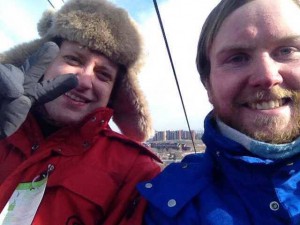
Working and learning Chinese, by Rob
China has been gaining more and more popularity among different people from around the world. Some foreign expats come to China for work with the intention of picking up some of the local lingo. Many other foreigners will come to China specifically to learn Chinese. Whichever category you fall into, learning Chinese is inevitable regardless of your main motives.
When living in China, even the most simple of tasks can be made challenging by the language barrier. Learning to speak Chinese becomes more survival as opposed to a hobby. When you can speak Chinese, your life gets easier and your blood pressure returns to its normal level!
I wanted to come to China to work because I always had the interest in learning Chinese and thought it would be a great opportunity. My first year in China could only be described as a “baptism of fire” as I quickly discovered that even the most simple of situations required the ability to communicate in Chinese.
I rehearsed as many simple phrases as I could before walking out the door in the morning in the hope they would come in handy throughout the day.
I lived and worked in west Beijing, and most lunch times in the local restaurants became public entertainment for anyone close enough to hear me say anything. Thankfully, these situations got easier and easier but I still lived in fear of the waitress asking a question, which I was not prepared for!
The challenge has always been exciting for me and I would say such an environment is the best way to learn any language.
Despite working full time hours, I always managed to find time to see a Chinese teacher. This was important in the early stages, as I needed coaching on how to say the tones correctly. As time progressed, my lesson focus shifted from pronunciation to grammar.
After several years I had reached a point where most daily tasks had become manageable and I could handle basic Chinese. It has been exciting to watch the world come alive around me, as I have been able to understand more and more.
I still continue to improve my Chinese and I am currently working towards taking the HSK5 Chinese test. Wish me luck! 
An introduction from our Chinese Teacher- Grace Liu
One of the best things about living in Beijing is the being able to learn Chinese. We have a great Chinese teacher at Aihua who is there for any foreign teacher who wants to improve their Chinese.
Our teacher would like to introduce herself to our new teachers and anyone thinking of joining us in the future:)
Hello everyone! My name is Grace. I am so glad to be your Chinese teacher. I come from Qufu, the hometown of Confucius. In 2008,I graduated from Qufu Normal University. I like reading, cooking and traveling. I am also interested in traditional Chinese culture. If possible, I wish I could travel in your countries and know about your culture. I hope all of you can enjoy your life in China, and I will try my best to help you to improve your Chinese. Thanks!
In our Chinese class, you can learn and practice listening, speaking, reading and writing. Of course, communication is the most important. At the very start, we will learn Pinyin, then we will know about the formation of Chinese Characters, it will help you a lot in your future study. If you are interested in it, you could even try calligraphy. Then we will learn some simple phrases and sentences like: 你(nǐ)好(hǎo), 谢(xiè)谢(xiè)and对(duì)不(bu)起(qǐ)(I am sure you can already say them very well).The textbook we use is very practical .My most important advice is try to use Chinese whenever you have a chance. As you make progress day by day, you will belong to high-level classes and use different books. Some of you may try HSK, some of you may become old China hands, some of you can travel all over China without difficulties, some of you may settle down in China. Let us work hard in learning Chinese, it opens a new window in your life!








